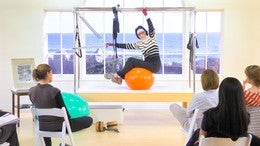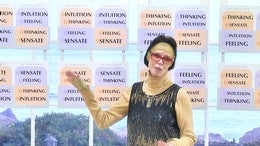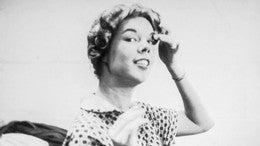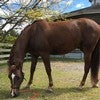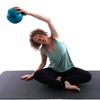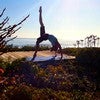Description
About This Video
Transcript
Read Full Transcript
Chapter 1
First Impressions of Mary
Hi everyone, it's Christy here and Elsa Gundo at our [inaudible] anytime main office. And I'm down here today because I have the wonderful opportunity to explore the wonderful Mary bone a little further and who better to do that then to people who have worked with her for 40 plus years, both in analytical and [inaudible] dimensions. Um, this is Gordon Thorn and Annie Woodhall. So welcome. Thank you. Thank you for being here. Happy to be here. Um, this all came about very quickly and as I was driving down here today, meaning in the last couple of days, I found out they were here. We tried to do this a year ago and, and it's very spontaneous in a way. And I thought how perfect because isn't that how Mary is?
And she did send a message to say, make sure to have fun and these are the right people to, to do that with and to feel free with. So I do. And um, I'll start. I want to know everything about her having 40 plus years. We got to get going. But I want to know everything that you're willing to share about your experience with her. And, um, mine is limited. Much of the [inaudible] community is limited, which is where we come from. I know there's much more to marry than PyLadies.
And I'm interested in hearing about that because it is obviously part of her work. Um, my personal experience with her has been profound. She's imprinted on me in just a few years. Um, a great influence. And I don't know that I could put it towards yet. I Bet I can. More so after speaking to you today. But, but it, there is this spontaneity, there's this realness to her. There's this depth, there's this humor and um, there's something in that that I believe from the Pilati side of things really does perfectly match the philosophy.
I don't know much about, uh, union union analysis. And I know that you've both worked with her in both capacities. I think. So I'll, I'll start with that. And also to tell you what she says about you. Cause I said, Mary, who are these, what do I do? What do I ask them? Um, and, and among other things, this was the first thing she said.
These are old souls, Christie. And yet as you meet them, you will meet too easygoing, unassuming, lovely people. A little bit later on in the email, she said that they are the journey that we've all been on together and she included herself for the last 40 or so years, um, has been a great adventure. And then she said you were both in it for the whole, I want to say the whole ride or the whole thing, you're in it for the whole thing. So I do want to know what that means. What do you think she means by that? That let's start there and then I'll take, I'll, we'll go way back the beginning. But what do you think
And you know, for instance, I didn't know, I wasn't looking for a Mary Bowen, I wasn't looking for plays. I wasn't looking for anything that I'm actually doing now. It really feels like it's all come from that, um, journey into myself. And so I think she means when you do that work, you, you, you're not skipping over things. Your, you're really having to grapple with the deepest, darkest things. To what end, I guess, your, your, your wholeness.
So I would say none of server finished. It's not as though at a certain moment I'm going to say, okay, now, now I'm hall now. But just if I think about my own life, there's a kind of authenticity to the things that I've done, which I'm only, I am the judge of that really. But, um, I was never really trained for anything in a formal way that I'm actually doing just, yeah. It's just all been a kind of discovery and I study along the way like [inaudible] or the body or poetry or, and I work with children, but um, it's really kind of all come from inside. And so the end for me is what is the quality of my life? What's the quality of my interactions?
How do I feel satisfaction about what I'm doing and, and how I express myself. Yeah. Is that,
Not Ultimately, but in that instance. So it was 1971 and I was newly in new haven, Connecticut. And um, I just, I didn't have enough to do and I was kind of like, were you married yet? No, we weren't. We were both with other people with other people don't, how much are we going to get? Go into that however you, but anyway, if it matters, talk about it. If it doesn't. So I was, they're newly married and quite kind of lost. And I looked in this local little paper. And so yoga call, six, six, three, two one, one one I think snow that year. And so I called it and there's this incredible voice, Mary's voice, you know, gigantic voice. It's kind of terrifying. And, but I went, had you done yoga before? I'd never done yoga. Yeah. So, um, she had an amazing house with incredible lots of cats and is very formal, rigorous yoga. And um, I went once and this one to one? Yeah, one to one. Okay. I didn't know if I ever wanted to go back. It was really, she's so large. Pretty. It was scary.
Yeah. Lovely way. Yeah. If you're up it. Yep. And then little by little I'm, you know, she really, if I would call and say, well, I don't think I'm going to come, you know, she said, well, why don't you come? Anyway. So I really kept going and it quickly developed into, you know, I was devoted to it and then I started having difficulties with different things and then, you know, we'd talk about that. And then she said at one point, we, you should really bring in a dream. But she wasn't an analyst. She wasn't, I think this was, I ha we have to check this out, but thought she went into practice in her sixties or later. No, no. Yeah, I got that wrong. So, um, so then she said, bring in a dreams that I'm taking in a dream. And it was really amazing and I, I kind of took to that cause I'm very intuitive and so I just sort of lapped it up. And then, um, and so then sometimes I bring a dream and sometimes we just do yoga and then sometimes we would just chat. And then, um, one day I went and I was crying and I said, well, what are you, are you, are you a therapist? Are you a yoga teacher? You my friend? And she said, I'm all three. And so that was a big beginning.
And then I started telling friends about it and then my friends started going. And then, um, Gordy's first wife was a friend of mine, so they started coming and then she got Gordy to come. And so I'm pretty sure that was the beginning of, you know, of her practice. I should have asked her, but I think now that I'm thinking maybe she started practicing, um, she was already doing her [inaudible] but in 65 that might be where you have that number in my head. But what was your first impression of her? Outside of the voice? Yeah. Um, her body. I really remember her body and her stance and her carriage and her authority and then along with it was this incredible sense of humor.
So I think that was what I first felt the authority and the, the, you know, if I'm sort of picturing it right now, like tall authority and confidence and, and it was a, it was a quality that I'd never seen before. There was something else going on that I really did not know what it was and a lot of power. It sounds that I would've been a good match to what you were. Yeah, exactly. Exactly. And then, um, more of the humor, more of the sides came in, more of the silliness, more of the, um, so that it, it became not terrifying. But, um, I guess that's my beginning way of seeing her. Yeah. Thank you, sir. Your wife taught yoga to no, and, um,
Did you continue with the physical practice of Yoga with her? Yes, I did. They were, they were separate, but there were, I'd always been, I'd always been very lucky in my body that I hadn't, I, I was coordinated. I could do things I never had a problem with, with, uh, with sports or any kinds of things like that. So I just took my body for advice for granted, basically. And, and, um, but, um, I realized I flexibility was something that I, that I was, I just felt like I'd see dancers. I was working with some dancers and stuff at that time and I'd see the flexibility that dancers had. And I thought, you know, I wonder if I can do that. And, um, so the, I was really amazed by just the beginning of some of the yoga things, just how, how the body could actually find itself able to move into some of these things. So, so I was fascinated by that too, but it was, um, um, sort of a parallel stream.
And so pretty soon on after Yoga I was augmenting it with bodies. Yeah, that was the question. Yes. Okay. I was, and it was down in the basement and spiderwebs. And you went down these rickety stairs and, and use that machine. Yeah, it was really, what did you think of that? I mean now in now you've had, had you done some analysis with her at this point? We'll, it was kind of all mushed in my mind about what's which, which came, which, but um, but it was different from yoga. It was different from Yoga, but um, but it was, it was great. It was amazing. Yeah. Did she talk much about
You know that it really, that it, it helped you stay in alignment better. That there was a structure to it, which was better. You could overstretch. I remember that cause I, I'm pretty flexible and she would say, you can't, you can overstretch with Yoga. So it felt like the, um, I'll never forget that beginning with yoga and I still do yoga, but um, there's something that [inaudible] that um, has saved me in so many ways, many times and her way of teaching. It was a nice blend. It went into there. Yeah. Did you ever, so I guess wanting to know
Like knowing something about that person. And I found that I had that feeling about other people too in my life. You probably have as well. Um, and this was one of those, okay. Mary was totally, significantly one of those.
I remember that. And then, um, and then the Mary thing came along and then there was so much to it. I mean I was reading, Oh and I was interested in native American, um, you know, mystical teachings and everything. And then getting from, from from magic a cult, two native Americans, two young, young, his writing was so clear. So you started meeting it. Yes, yes. About these things that I was thinking about or intuiting and um, when I would have a dream I would do and Gordon and I both would do this. A lot of research. If you have a dream about an elephant, you know, I go, there was a time in our life, we had time, more time for doing things like that.
And you just sort of go down the path of well, what is an elephant and what is an elephant in lore or what's an elephant somewhere. So, um, it became part study too.
But it, those kinds of things are a part of the process too.
There are truths in that sense, you know, I mean, but you, you know, you, some people, I mean, if you accept them as truth, life is much more interesting than if you don't accept them. And, and so I often wonder why people want to not accept those things. Uh, or you know,
Chapter 2
How Mary's Teaching Has Changed
So I'm s now I'm going back to where we were just at, but I'm trying to see, did first of all, did she relate with everyone the way she was relating with you or were you too just relating back so that she could take you all three further into that? Does that make sense? Okay. So that's the first part. Yeah. I would, I think she completely takes each client person where they are and responds with everything she's got to them. So I really feel that I do not, no matter what, no matter what it is, no matter what. Yeah. That's,
So it's a big jump, but can you say, has she changed her teaching and I am sure she herself has to some degree, but her teaching, has it changed since 1971 or two two now for you? Or have you seen it change just in general?
Does she incorporate more of the dream type scenarios into her teaching? Um, probably with you, but can you tell if she's changed? Yeah. Yes. I think she's probably more efficient. She gets to the heart of it like yes. Right. And she, I think she's very intuitive. Yeah.
You know, why would you get up? Why not just check out, you know? Yeah.
So I go to a physical therapist and it doesn't work and, or I go do something else and it doesn't work or it partly works. But I realizing I, I'd come back to Mary because she has spent so much time doing this deep investigation of so many parts of her body that I can ask her about the knee and she'll have all these ideas because she's, she's kind of done it herself. She's done a lot of healing of different issues for herself. So she has her own authority. That's just coming from a creative adventure.
You know, it, it, it, I, I don't know why, but she's, I mean, I, but now if we're in a session or something, she'll sit there and she'll say, you know, and then I was in and I was kind of young and the minute she says that, I just yawn. I mean, I just, I find it just amazing.
I think it's probably like a core, it's it if you're, if lot is, is, you know, you're thinking about the core when you're doing everything or you're thinking about everything when you're doing everything, which is a tall order. Yes. And, um, but what a discipline, what an incredible thing to at least attempt to, to do in your daily life. But I think the yawn really accompanies that if, if out people need to think about it, cause I'm a real young convert and I go deeper into positions, I, you know, you can go deeper and deeper into whatever you're trying to accomplish physically by yawning and that's really incorporated into her. How does sessions, how did you learn to do it? I would, I, in the beginning, I, um, selfishly she asks, I clamped up to, okay, yeah, I really did. You know, she would be there yawning and it would make me just not young. So one time I had the courage, the same America do not yawn because I can't, I can't find it. I can't find it. So I, I had to kind of go into the dark room and start trying to yawn by myself. Yeah. Breathing gets you there. Yeah. But then she has all these tricks now, like inhaling through a straw and, and she's got some things to try that help bring on the on.
Yeah. So that's a very specific [inaudible]
So she's up against a lot too to bring in the whole person into teaching I think. And um, and our culture is very much that way. I agree. You know, it's not, it's not, um, it's not going to let go that easily. And, and that's again, I think that's why these things like humor and, and just, uh, you know, the outrageous behavior in a way,
Chapter 3
Bringing Jungian Psychoanalysis to Pilates
You know, she had some freedom and that she was engaged by something, but she, she's really described it. Sometimes she gets engaged by each individual. Yeah. She really does. Um, that part that's really ocracy of the whole thing that gets hard for her. It's just in the infighting and the different stuff, you know, just, it just, yeah. But I mean that comes with the process. I guess
The story is she'd worked very hard and we, we wanted to be together just outside of work and both of us were exhausted, but I was not going to let her know because I'm her host and it's her first and she's married Bowen and, and I'm walking up the flight of stairs to our hotel room to we're gonna, we decided we're going to eat in the room. We're not going to go out. So we've gone that far and I walk in and she says, let's just take a nap. And we did. I got on the bed with her, we took a nap and that was it. And then I went home. It was so wonderful because I can't yawn. I was not going to let her know. And she said, we need a nap.
And I was like, okay. And within minutes we were asleep on her bed. It was for me. That was like, she just taught me a huge lesson. It exactly what I needed. It was what she needed. She wasn't afraid to say it like Iowa and, and it was awesome.
That's one of my, yeah. Yeah. I'm not sure if Joseph believed Joseph. A lot is believe this, but I, if it's close and it's certainly something I've believed that the body is a physical manifestation of consciousness or of, um, what is going on inside. And that's about the extent that I can take it. But I'm curious if that it plays a role in those sessions with Mary. If Union analysis comes into play, if I hurt my shoulder, for example, um, is there any aspect I can personally analyze, you know, oh, well I'm carrying too much, you know, psychologically where does the psyche come in, in the physical aspect of, in your opinion, but also in your sessions.
Yep. So I'm an, I'm an intuitive and an introverted person and so the opposite for me is to be extroverted and to go into the body or to become more sensate. Intuition is sort of boundless and not, um, you know, you can go any which way into the future of the past or, or, um, sort of go into other people and have a sense of things. Um, you might not balance your checkbook very well, you know, um, and you're not kind of in your body. I mean, I didn't know what my body was for the longest time. It's the idea that you balance it with yes. Yeah. You really balanced it with the opposite. So for me as an intuitive, I have to go into my body all the time and find it. And so, oh, I've found it so much more now. So I do know I have a body now, but, um, but it's, it's always a journey. So there's that assumption when I'm doing a plays a session with Mary and you know, there will be, oh my gosh, there's another part of the body that you don't know about, you know, you haven't connected with, so you can yawn and Yada Yada and kind of get to the ankle or the little toe.
Um, you know, the yawning is quite a tool for the intuitive that can't quite figure it out. And, um, and, and, and there's, again, there's that assumption that this is what I, this is the most important work for me to really find out what's going on for my body and really go on the journey of it. And it sort of connects with that other Mary's, that same type. She's just an extrovert to start with. And so, you know, we, we can share a lot about the difficulty of, of doing it, but I feel like all the injuries or problems I've had, just my, just my psyche saying you have to learn about every part of the body. And I think the only, you know, maybe the only way for me is to have it hurt or something.
Otherwise I'm just happy to ignore the whole thing. But the hurt you think still relates to the part of the body, not necessarily something else. Yes. Yeah. Yeah. And it makes me have to go in there. It makes me have to understand more. And, and basically this sort of push towards wholeness is how do you make it, it's interesting with Joseph Pilati said, but for me, I think my task is how to make my entire body conscious of itself and for me to be conscious of it. Okay. Does that make any sense? I mean, it does. I don't know that I can verbalize it back, but I want to try one piece. Okay. When you say you've got a, so your foot or your ankles injured and you've got to, the psyche is telling you you need to learn more about that part of your body.
Do you mean tendons, muscle, bone? When you say that or do you mean you do, okay. You're making yourself conscious of it and how to move it and how to um, wait, how to take action, how to wait, how to pause, how to have the, the right alignment, you know, what do I need to know about that whole area? Do you even how it looks or how it's functional. I can go there. Yeah, I can let it go there. Well, you can, right, exactly. But if you don't, I guess what I'm wondering is is the point then to transfer it outside to the rest of the world or is it just simply not simply, but is it just to become conscious of how it works, how it is, what it is or are you using that as a metaphor for living in other word? Does that make sense? Yeah. So, so for me, I'll just do an example. So if I, if I have an injury, um, in my ankle, I don't, and I discover something and I fix it, heal it, or it gets better.
It's not as though I feel that's my job to teach the world about that. No. You know, it's that, that, that means I'm more integrated in my mind. I'm more integrated in my body and probably that integration for me to be more integrated in my body makes me more intact. And maybe I'm better at doing the things that I do. And in that way, maybe I am better at relating to you or Gordy, but it's not child I'm working with. Sorry. You know? Yeah. It's not necessarily, oh, I'm leaning to the right so much and I really should find more balance in my life, or I'm, or I'm, you know what I'm saying?
Okay. That's a, the storytelling.
I'm not sure I know how to answer for anybody, but, um, um,
I think she understands where people's imagery is coming from. And that's, for me, that was a big plus. And so I, I was fascinated in what she knew and, and she was interested in some of the things I was doing. So that was just something we could really share. It was great. Yeah. She said something, I'm not quoting her directly, but it's close, was creative. Creativity is everything in that same email that she sent was, was everything for her. And, um, I read something recently just about how creativity is directly related to satisfaction of life. So I don't know if it's fascination with life, but yeah. Um, I, it makes sense to me.
Chapter 4
Mary's Legacy
but I'm going to push you a little further with it. Um, for people out, what do you think Mary would want people to know about her now? She's got a pretty big stage in the [inaudible] community, but just in general, if anybody can, what do you, what do you, knowing her so well, what do you think she would want people to know about her now? And the next part of that of course, will be when she's, it's, it's her legacy, but what do you think she wishes her legacy would be if they're different?
And maybe just, maybe, I wonder if you take a poll, and I would imagine the psyche is not as known as the body, you know? And so I would think she would want the psyche to be involved in how people view the body or, or, or how people view themselves and what existence is. We have a body and we're hanging around here, but um, there's another level to our existence.
So maybe she'd want to be known for that encouragement. You know, I want you to be yourself. I want you to do the hard work of knowing how to be yourself. Um, and here are some things.
And I mean, is there a book? Is there a, you know, and, and it's, it's hard because so much of I think who Mary is is really left with the people she's worked with. You know, they carry that on. And, and maybe that's the way it really is. And, um, how will you carry her on? How do I, how will you, um, well I would not be who I am and without, without her. So I mean, I think it's this thing of [inaudible], you know, it's, it's, I think ideally what you want to be able to do, what I would want to be able to do is, is speak from Mary, not about her. You know, that it's, it's, it's that I carry, I carry so much that I've learned from, from her, but I mean, it's fun to sit here and talk about her, but it's also, um, uh, I mean the way I see the world, um, it is very much framed by 40 years of having her in my life. No question.
And then there's his red book where he had to paint and do all his visions and he had to make sense of so much because there wasn't language for it. Yeah. It's not as though he made that stuff up, that those forces and those elements existed and he had to figure out how to describe it to people. And so that was his legacy. You know, he, and there's all these other layers to his legacy. But, so now this generation for Mary, so influenced by young and, and his teaching and how that formulated her, it, it's so interesting to think of, well, what is the legacy of that? How does that get passed on? She's not, I do think it's individual by individual and then some of her talks to large bodies of people. Um, it's, it's, and then that fans out in it's way. So I don't, I don't know the form. I feel, I, I feel like, I don't know if there's another thing to do and if this will do it, you know, or whatever, or, or be a part. But, um, I, I feel like there's been a lot of power in and gift in, in the individual work and who knows, knows how much we're supposed to.
It's the way she can have the conversation with you and go straight to the heart of you and, and there's, there's not a sense of needing to back up. Um, but all of a sudden you're being yourself by being with her, I think. And so for me, if you'd never get to meet her, find everything you can about her in visual form and, or people that she worked with. So for me, that's the best I can do. I think, uh, for now, for anyone thinks of something else, let's do it because it's, it's, I think it's part of overall point, you know, including Palabra is, and that's where I have to, I come from as my container, right. It's not necessarily where I stay, but it's my container. Yeah. It's, and it makes sense to me that if you can get in your body and you can explore yourself, you can become more of yourself however it happens.
But she's doing that with a really, really powerful way, certainly by testimonial and, and just if you get the chance to be with her, you can feel that. And so I, I hope that for everyone and I hope that somehow we can all carry that on for her just or continue to become more of our own selves, like you said. [inaudible]
She got him there every, every week and got him on the machines. She wasn't intimidated one teeny bit by his limitations. Uh, I mean I would've just, when I looked at him I thought, oh, how could, how, where would you, where would he be comfortable for me to touch him if I was an instructor? So that it was, it was so amazing to think she just had him on every machine doing whatever he could do. She was with him, with him and it, I just think her force of will got him out of his house, into his car. They're doing maybe what he didn't want to be doing, but he really changed. Yeah. Certain things changed.
I was there long enough to see that happen. It was really extraordinary. So that's just that fearlessness, the, um, and, and the doing the kind of impossible. That seems like it's such a huge part of her too. And taking each person exactly where they are. You know, making it more, there's more we can get here. Yeah. Really something.
Comments
Thank you Kristi for asking all the right questions and connecting with all these wonderful people! Hugs to you!
You need to be a subscriber to post a comment.
Please Log In or Create an Account to start your free trial.
